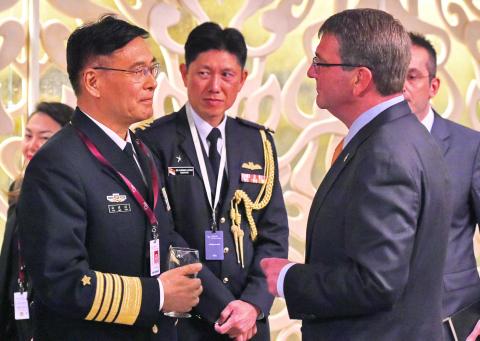China yesterday rejected US demands to stop land reclamation at disputed islets in the South China Sea, saying that it was exercising its sovereignty and using the controversial outposts to fulfill international responsibilities.
Chinese People’s Liberation Army Admiral Sun Jianguo (孫建國), deputy chief of the general staff department, told a security summit in Singapore that “the situation in the South China Sea is on the whole peaceful and stable, and there has never been an issue with the freedom of navigation.”
“China has carried out construction on some islands and reefs in the South China Sea mainly for the purpose of improving the functions of the relevant islands and reefs, and the working and living conditions of personnel stationed there,” he said.

Photo: AFP
“Apart from meeting the necessary defense needs, it is more geared to better perform China’s international responsibilities and obligations regarding maritime search and rescue, disaster prevention and relief ... and safety of navigation,” he added.
China insists that it has sovereignty over nearly all of the South China Sea, but rival claimants accuse it of expansionism.
“When dealing with maritime disputes with relevant neighboring countries, China has always kept in mind the larger interest of maritime security,” Sun told the annual Shangri-La Dialogue. “In spite of the sufficient historical and legal evidence and its indisputable claims, rights and interests, China has exercised enormous restraint.”
Sun was speaking a day after US Defense Secretary Ashton Carter demanded an end to all reclamation work.
“There should be an immediate and lasting halt to land reclamation by all claimants,” Carter said. “We also oppose any further militarization of disputed features.”
The Singapore summit, which ended yesterday afternoon, was earlier in the day marred by a brief security lockdown after police shot dead a local motorist who tried to flee a checkpoint near the event venue in a car later found to contain drugs.

CHAOS: Iranians took to the streets playing celebratory music after reports of Khamenei’s death on Saturday, while mourners also gathered in Tehran yesterday Iranian Supreme Leader Ayatollah Ali Khamenei was killed in a major attack on Iran launched by Israel and the US, throwing the future of the Islamic republic into doubt and raising the risk of regional instability. Iranian state television and the state-run IRNA news agency announced the 86-year-old’s death early yesterday. US President Donald Trump said it gave Iranians their “greatest chance” to “take back” their country. The announcements came after a joint US and Israeli aerial bombardment that targeted Iranian military and governmental sites. Trump said the “heavy and pinpoint bombing” would continue through the week or as long

TRUST: The KMT said it respected the US’ timing and considerations, and hoped it would continue to honor its commitments to helping Taiwan bolster its defenses and deterrence US President Donald Trump is delaying a multibillion-dollar arms sale to Taiwan to ensure his visit to Beijing is successful, a New York Times report said. The weapons sales package has stalled in the US Department of State, the report said, citing US officials it did not identify. The White House has told agencies not to push forward ahead of Trump’s meeting with Chinese President Xi Jinping (習近平), it said. The two last month held a phone call to discuss trade and geopolitical flashpoints ahead of the summit. Xi raised the Taiwan issue and urged the US to handle arms sales to

State-run CPC Corp, Taiwan (CPC, 台灣中油) yesterday said that it had confirmed on Saturday night with its liquefied natural gas (LNG) and crude oil suppliers that shipments are proceeding as scheduled and that domestic supplies remain unaffected. The CPC yesterday announced the gasoline and diesel prices will rise by NT$0.2 and NT$0.4 per liter, respectively, starting Monday, citing Middle East tensions and blizzards in the eastern United States. CPC also iterated it has been reducing the proportion of crude oil imports from the Middle East and diversifying its supply sources in the past few years in response to geopolitical risks, expanding

An Emirates flight from Dubai arrived at Taiwan Taoyuan International Airport yesterday afternoon, the first service of the airline since the US and Israel launched strikes against Iran on Saturday. Flight EK366 took off from the United Arab Emirates (UAE) at 3:51am yesterday and landed at 4:02pm before taxiing to the airport’s D6 gate at Terminal 2 at 4:08pm, data from the airport and FlightAware, a global flight tracking site, showed. Of the 501 passengers on the flight, 275 were Taiwanese, including 96 group tour travelers, the data showed. Tourism Administration Deputy Director-General Huang He-ting (黃荷婷) greeted Taiwanese passengers at the airport and